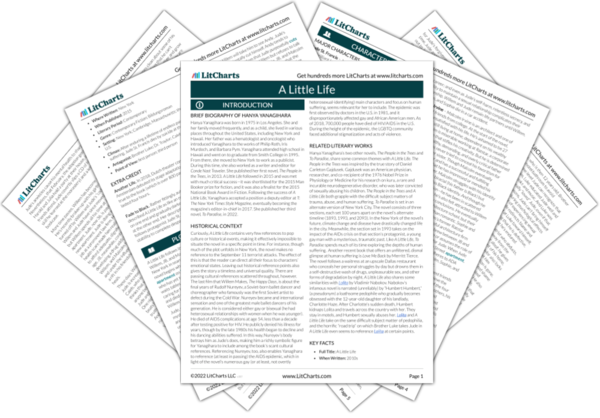Hemming Quotes in A Little Life
Perhaps because of this, he felt he always knew who and what he was, which is why, as he moved farther and then further away from the ranch and his childhood, he felt very little pressure to change or reinvent himself. He was a guest at his college, a guest in graduate school, and now he was a guest in New York, a guest in the lives of the beautiful and the rich. He would never try to pretend he was born to such things, because he knew he wasn’t; he was a ranch hand’s son from western Wyoming, and his leaving didn’t mean that everything he had once been was erased, written over by time and experiences and the proximity to money.
“I’m not Hemming, Willem,” Jude hisses at him. “I’m not going to be the cripple you get to save for the one you couldn’t.”
On these days, he succumbed to a sort of enchantment, a state in which his life seemed both unimprovable and, paradoxically, perfectly fixable: Of course Jude wouldn’t get worse. Of course he could be repaired. Of course Willem would be the person to repair him. Of course this was possible; of course this was probable. Days like this seemed to have no nights, and if there were no nights, there was no cutting, there was no sadness, there was nothing to dismay.

Hemming Quotes in A Little Life
Perhaps because of this, he felt he always knew who and what he was, which is why, as he moved farther and then further away from the ranch and his childhood, he felt very little pressure to change or reinvent himself. He was a guest at his college, a guest in graduate school, and now he was a guest in New York, a guest in the lives of the beautiful and the rich. He would never try to pretend he was born to such things, because he knew he wasn’t; he was a ranch hand’s son from western Wyoming, and his leaving didn’t mean that everything he had once been was erased, written over by time and experiences and the proximity to money.
“I’m not Hemming, Willem,” Jude hisses at him. “I’m not going to be the cripple you get to save for the one you couldn’t.”
On these days, he succumbed to a sort of enchantment, a state in which his life seemed both unimprovable and, paradoxically, perfectly fixable: Of course Jude wouldn’t get worse. Of course he could be repaired. Of course Willem would be the person to repair him. Of course this was possible; of course this was probable. Days like this seemed to have no nights, and if there were no nights, there was no cutting, there was no sadness, there was nothing to dismay.











